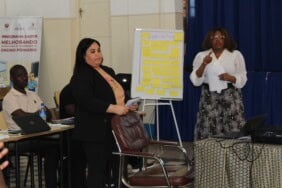Safeguarding with Sandra
September 16th, 2024 | Blogs
Ensuring children’s safety and well-being is the top priority of our programs. We work to prevent and respond to threats to children’s safety, promote healthy development, and foster positive learning environments. In Mozambique, World Education and JSI have developed a contextualized toolkit to operationalize our safeguarding policy throughout program implementation.
Sandra Omar is the safeguarding focal point for all our programs in Mozambique. She helps to conduct trainings, expand use of reporting mechanisms, and coordinate with community protection services. We talked with Sandra to hear more about this important work.
Widespread poverty makes it difficult for children to access basic needs such as food, health, and education. Forced early marriage threatens healthy development and interrupts education for young girls. In some regions, forced labor exposes children to dangerous conditions and exploitation.
Violence, including physical, sexual, and emotional abuse, is a constant threat to well-being. Armed conflicts in the northern region of Mozambique have displaced many families, leaving children vulnerable and without access to health and protection services or education.
In many rural communities, traditional leaders such as regulos, and community and religious leaders are responsible for ensuring the safety and well-being of the community by enforcing positive cultural norms and values. There are also many local organizations working in child protection.
Families have an important role in the daily care, protection, and education of children. Schools and churches teach people how to identify mistreatment, neglect, and other forms of abuse.
I have been developing messages for district officials to carry out awareness campaigns in schools and communities with the support of the USAID SABER community engagement team. The SABER program works to improve the lifelong learning potential of Mozambican children by expanding bilingual education.
The messages we are disseminating aim to reduce child marriage, school absenteeism, and abuse, and inform about the reporting mechanisms available in the country. I am also designing pamphlets and information, education, and communication materials to supplement these awareness campaigns.
 We provide training on safeguarding matters to school principals, teachers, and pedagogical directors. We developed a form to help volunteers recognize patterns of behavior, identify types of abuse, and understand reporting mechanisms. We also have a statement of commitment to safeguarding rules and clauses for external suppliers (e.g., rental cars, accommodations).
We provide training on safeguarding matters to school principals, teachers, and pedagogical directors. We developed a form to help volunteers recognize patterns of behavior, identify types of abuse, and understand reporting mechanisms. We also have a statement of commitment to safeguarding rules and clauses for external suppliers (e.g., rental cars, accommodations).
I have participated in national-level meetings with the prevention of sexual exploitation, abuse, and harassment network to coordinate community safeguarding approaches. I have also been in contact with gender focal points at the school level to facilitate case referrals. Our collaboration with the Office for Assistance to Women and Children Victims of Violence in Mozambique facilitates safe and rapid referrals.
 Firstly, I oriented all partner staff and trained focal points from each organization to promptly respond to safeguarding issues. We implement joint training programs so that everyone involved understands and knows how to apply the established policies in their day-to-day work. This includes advice on safe practices and reporting channels.
Firstly, I oriented all partner staff and trained focal points from each organization to promptly respond to safeguarding issues. We implement joint training programs so that everyone involved understands and knows how to apply the established policies in their day-to-day work. This includes advice on safe practices and reporting channels.
We hold regular meetings to review and align our internal policies, which usually include creating a set of guidelines and procedures that all parties must follow, thus ensuring a harmonized approach. I have also been supervising activities and safeguarding requirements, which include visits to partners, activity sites, and intervention schools.
For program staff, we ensure that all requirements are met and in compliance with the JSI/WE safeguarding policy through annual refresher trainings, job posting oversight, criminal record checks, and other requirements.
Together with the SABER monitoring and evaluation team, we created indicators—such as number of materials disseminated and percentage of volunteers trained—to evaluate and report the results of safeguarding activities. We also developed an annual safeguarding plan to keep everyone on track.
Everything I’ve created I have tried to make applicable to all JSI programs and partners. Collaboration has been very important between World Education, JSI, and all our partners. I’ve helped to identify and train focal points in JSI’s MOMENTUM Routine Immunization Transformation and Equity project to support the implementation of safeguarding measures. Our teams communicate regularly via WhatsApp, and I share resources to help team members retain important safeguarding information.
World Education fosters enduring partnerships across regions and sectors to advance education outcomes for all. We offer education systems strengthening, program design and implementation, applied research and evaluation, capacity development, and policy development services.